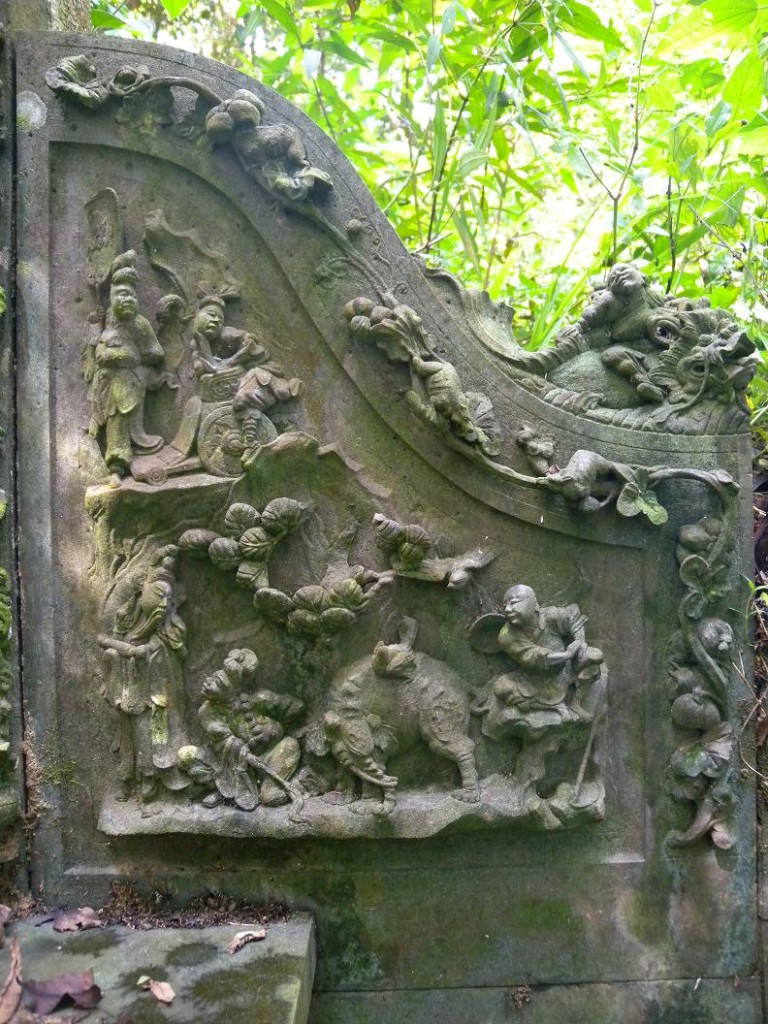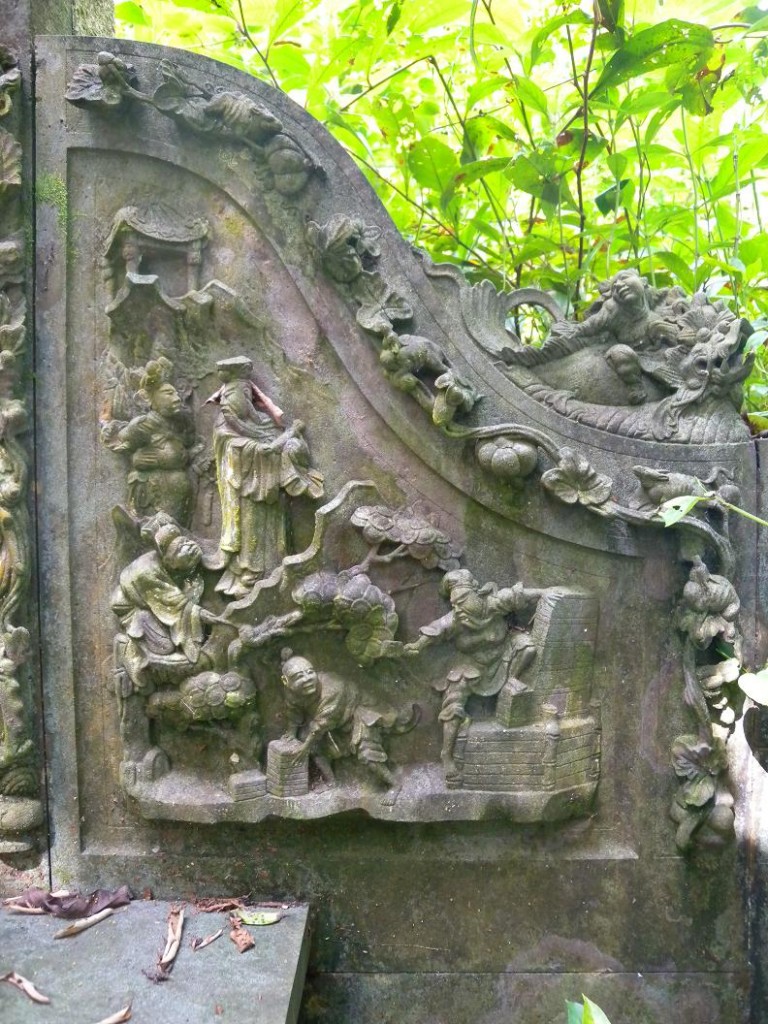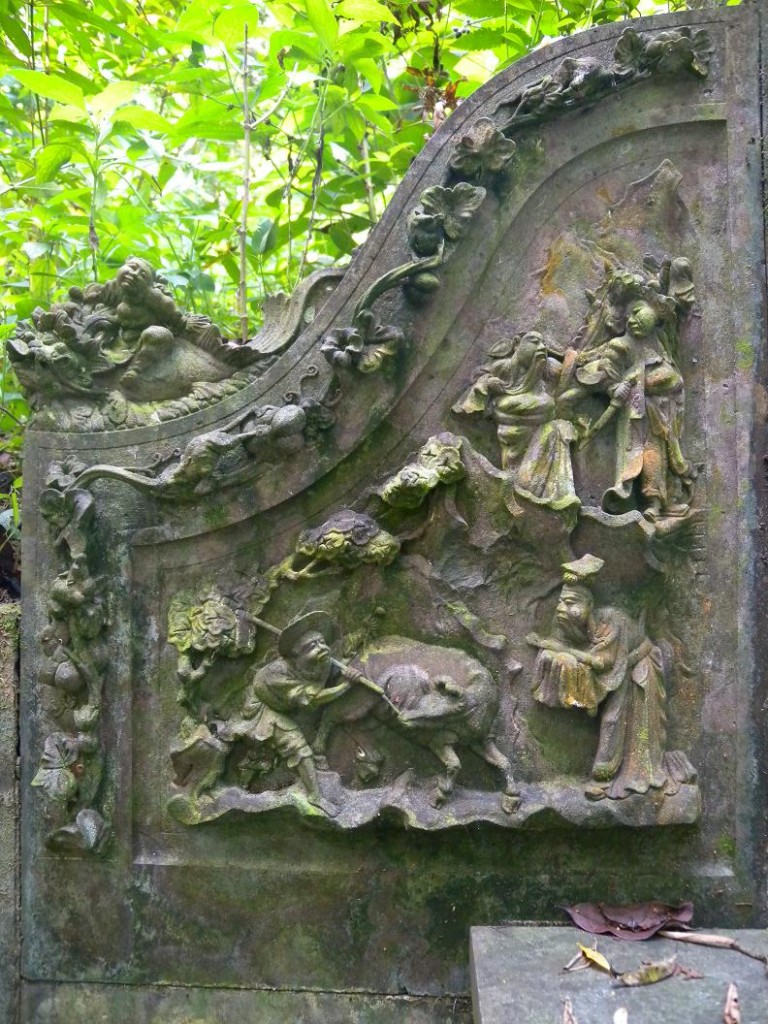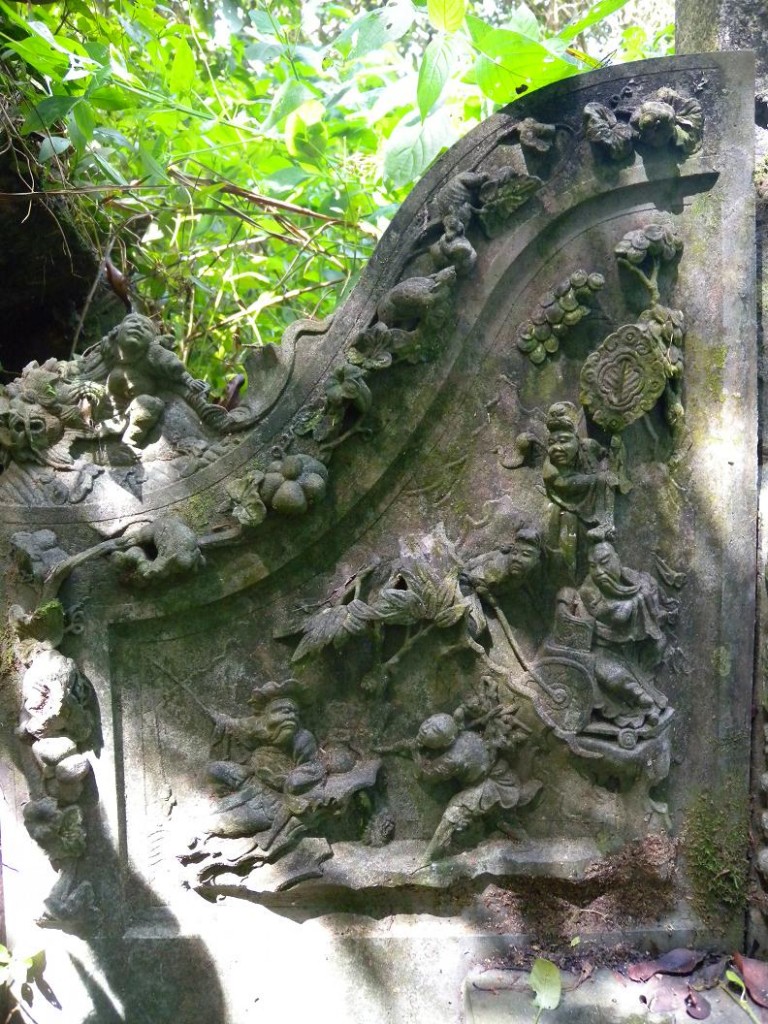By Royal Appointment
2Four Appointments (四聘)
by Ang Yik Han
Yet another set of four popular stories from Chinese history, this time found at the double tomb of Chew Joo Chiat and his wife, the subjects of the “Four Appointments” are two great rulers and two renowned officials who assisted their masters ably in establishing their kingdoms.
1 Yao Appoints Shun (尧聘舜)
Yao (尧), a great ruler of the Xia Dynasty (夏朝) the origins of which have been lost in time, was troubled. His son was not fit to assume the mantle of leadership and the whole land knows it. He had no choice but to hand over to someone from outside the family but a suitable candidate had to be sought. Word came to his ear of a filial young man, Shun (舜), a commoner who had lost his mother at a young age. His father’s already bad temper became worse after this and after he remarried, his affection turned from him to his new son. Shun’s stepmother and his stepbrother also treated him badly. Despite this, he was steadfast in his obedience to his parents. His filial piety was such that one day, the celestial courts sent an elephant to help him till the soil and birds to weed his fields. Yao judged that Shun was the best candidate for the position after he met him and even married his two daughters to him. Shun did not fail to disappoint and became another great ruler. The motif of the elephant in Chinese art has since been associated with peace and prosperity in the land on this account.

Shun sits by his fields as the elephant and what looks like a well-fed bird helps him out with his farming. Yao approaches from the left. (photo Yik Han)
2 Shun Appoints Yu (舜聘禹)
During Shun’s (舜) reign, floods were a constant scourge for the people. He appointed Gun, father of Yu (禹) to tackle this problem. Gun’s efforts were ultimately unsuccessful and Yu was appointed in his place. Unlike his father who tried to stem the flood waters with dams and embankments and failed, Yu created tributaries to disperse the waters. He was so dedicated to his work that he was supposed to have traveled around the land continuously for ten years. Even though he passed by his house 3 times, he did not stop to visit his family and missed his child’s birth and growing years. When he eventually succeeded in taming the waters, his knowledge of the lay of the land was unsurpassed. Coupled with his well-known concern for the people’s welfare, none was thought more eligible to take over as Shun as ruler. Till today, he is known as the “Great Yu” (大禹) in remembrance of his deeds.

Yu building a brick wall in preparation to channel the flood waters as Shun arrives on the scene. (photo Yik Han)
3 Shang (Cheng) Tang Appoints Yi Yin (商汤聘伊尹)
The last ruler of the Xia Dynasty (夏朝) was a tyrant notorious for his wanton cruelty and excesses. He paid no heed to governmental matters, which was to be his undoing. One of his vassals, Cheng Tang (成汤) saw the opportunity to advance himself, quietly built up his strength and bringing men of talent into his fold. Hearing about Yi Yin (伊尹), he visited and met him with his buffalo. Yi Yin rebuffed his invitation however, stating that he had no wish to become an official and that he had no abilities to speak of. Cheng Tang had no choice but to leave. Soon after, however, Yi Yin was brought to his attention again, such was his reputation. It was only on Cheng Tang’s third visit that he succeed in convincing Yi Yin to cast his lot with him. With his help, Cheng Tang overthrew the Xia and became the first king of the Shang Dynasty (商朝). As for Yi Yin, he is remembered as a great politician, strategist, philosopher as well as a good cook; he was adopted as one of the patron deities of cooks in China.

Yi Yin pulling his buffalo behind him as Cheng Tang respectfully makes clear his intention in meeting him. (photo Yik Han)
4 King Wen Appoints Tai Gong (文王聘太公)
During the Shang Dynasty (商朝), the Duke of the West, Ji Chang (姬昌), traveled around his realm to seek men of talent who could help him administer his domain. One day, on the banks of the River Wei, he saw an old man who was fishing with no bait, using only a bare fish hook which was straight instead of curved. When asked why he did this, the old man replied that those who were willing would be hooked voluntarily. Realising he had met an exceptional person, the Duke invited the old man into his carriage and personally pulled him along for eight hundred steps. The old man, Jiang Ziya (姜子牙), was to become the Duke’s trusted advisor and his kingdom’s chancellor, helping his son overthrow the tyrannical rule of the Shang Dynasty and establish the Zhou Dynasty (周朝). Ji Chang was given the posthumous title of King Wen (文王) after his son’s success and his able advisor was appointed as the Grand Duke (太公). This story forms part of the “Investiture of Deities” (封神演义), a fictionalised account of the Zhou’s triumph over the Shang replete with supernatural elements which has been part of popular literature and performance arts for centuries.

The Duke of the West on his way to visit the old man who waits for fish which cast themselves willingly on his hook. (photo Yik Han)
A common thread runs through the four stories: in their search for men of ability and virtue to help administer the country, rulers have to humble themselves and seek far and wide. The stories are a reminder of the respect that society is supposed to accord to the ones who have both the talent and heart to assume the mantle of government.

Comments
Trackbacks
Check out what others are saying about this post.[…] learn more about the other three stories on Chew Joo Chiat’s tomb, read Yik Han’s post here. Tweet(function() { var po = document.createElement('script'); po.type = 'text/javascript'; […]
[…] exemplify a certain virtue: Zhuge Liang – loyalty (忠), Liu Bei – benevolence (仁),Shun – filial piety (孝), so there we have part of the traditional set of virtues 忠孝仁义, […]